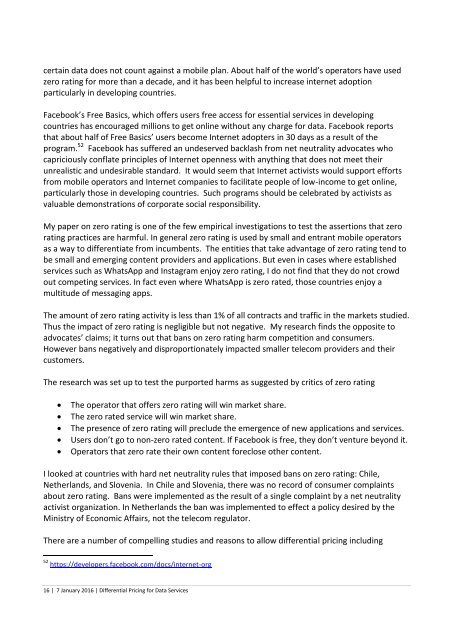Layton
Layton
Layton
Create successful ePaper yourself
Turn your PDF publications into a flip-book with our unique Google optimized e-Paper software.
certain data does not count against a mobile plan. About half of the world’s operators have used<br />
zero rating for more than a decade, and it has been helpful to increase internet adoption<br />
particularly in developing countries.<br />
Facebook’s Free Basics, which offers users free access for essential services in developing<br />
countries has encouraged millions to get online without any charge for data. Facebook reports<br />
that about half of Free Basics’ users become Internet adopters in 30 days as a result of the<br />
program. 52 Facebook has suffered an undeserved backlash from net neutrality advocates who<br />
capriciously conflate principles of Internet openness with anything that does not meet their<br />
unrealistic and undesirable standard. It would seem that Internet activists would support efforts<br />
from mobile operators and Internet companies to facilitate people of low-income to get online,<br />
particularly those in developing countries. Such programs should be celebrated by activists as<br />
valuable demonstrations of corporate social responsibility.<br />
My paper on zero rating is one of the few empirical investigations to test the assertions that zero<br />
rating practices are harmful. In general zero rating is used by small and entrant mobile operators<br />
as a way to differentiate from incumbents. The entities that take advantage of zero rating tend to<br />
be small and emerging content providers and applications. But even in cases where established<br />
services such as WhatsApp and Instagram enjoy zero rating, I do not find that they do not crowd<br />
out competing services. In fact even where WhatsApp is zero rated, those countries enjoy a<br />
multitude of messaging apps.<br />
The amount of zero rating activity is less than 1% of all contracts and traffic in the markets studied.<br />
Thus the impact of zero rating is negligible but not negative. My research finds the opposite to<br />
advocates’ claims; it turns out that bans on zero rating harm competition and consumers.<br />
However bans negatively and disproportionately impacted smaller telecom providers and their<br />
customers.<br />
The research was set up to test the purported harms as suggested by critics of zero rating<br />
<br />
<br />
<br />
<br />
<br />
The operator that offers zero rating will win market share.<br />
The zero rated service will win market share.<br />
The presence of zero rating will preclude the emergence of new applications and services.<br />
Users don’t go to non-zero rated content. If Facebook is free, they don’t venture beyond it.<br />
Operators that zero rate their own content foreclose other content.<br />
I looked at countries with hard net neutrality rules that imposed bans on zero rating: Chile,<br />
Netherlands, and Slovenia. In Chile and Slovenia, there was no record of consumer complaints<br />
about zero rating. Bans were implemented as the result of a single complaint by a net neutrality<br />
activist organization. In Netherlands the ban was implemented to effect a policy desired by the<br />
Ministry of Economic Affairs, not the telecom regulator.<br />
There are a number of compelling studies and reasons to allow differential pricing including<br />
52 https://developers.facebook.com/docs/internet-org<br />
16 | 7 January 2016 | Differential Pricing for Data Services


